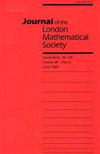On the long-time behavior of solutions to the Navier–Stokes–Fourier system on unbounded domains
IF 1
2区 数学
Q1 MATHEMATICS
Journal of the London Mathematical Society-Second Series
Pub Date : 2025-01-05
DOI:10.1112/jlms.70067
引用次数: 0
Abstract
We consider the Navier–Stokes–Fourier (NSF) system on an unbounded domain in the Euclidean space , supplemented by the far-field conditions for the phase variables, specifically: as . We study the long-time behavior of solutions and we prove that any global-in-time weak solution to the NSF system approaches the equilibrium in the sense of ergodic averages for time tending to infinity. As a consequence of the convergence result combined with the total mass conservation, we can show that the total momentum of global-in-time weak solutions is never globally conserved.
求助全文
约1分钟内获得全文
求助全文
来源期刊
CiteScore
1.90
自引率
0.00%
发文量
186
审稿时长
6-12 weeks
期刊介绍:
The Journal of the London Mathematical Society has been publishing leading research in a broad range of mathematical subject areas since 1926. The Journal welcomes papers on subjects of general interest that represent a significant advance in mathematical knowledge, as well as submissions that are deemed to stimulate new interest and research activity.

 求助内容:
求助内容: 应助结果提醒方式:
应助结果提醒方式:


